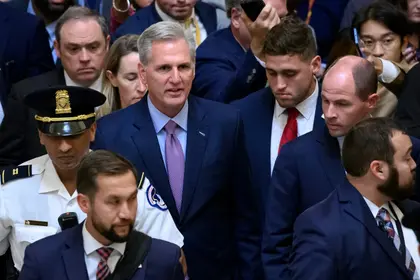In a dramatic turn of events, the US House of Representatives witnessed a historic moment on Tuesday, Oct. 3, as its Republican Speaker, Kevin McCarthy, was removed from his position. McCarthy fell victim to a rebellion by a small far-right clutch in his Republican Party.
JOIN US ON TELEGRAM
Follow our coverage of the war on the @Kyivpost_official.
This happened just a few days after Congress narrowly avoided a government shutdown.
A temporary acting speaker, Representative Patrick McHenry, will be in situ until a new permanent speaker is elected.
How was McCarthy removed from his position?
The rebellion was spearheaded by Representative Matt Gaetz, a Republican from Florida known for his far-right stance. During the subsequent vote, initiated by Gaetz and attended by a full chamber of representatives, McCarthy lost his position as Speaker of the House.
A total of 216 members favored removing McCarthy, while 210 were against. Eight Republicans joined forces with 208 Democrats to oust McCarthy.
"The office of Speaker of the House of the United States House of Representatives is hereby declared vacant," said Republican Representative Steve Womack of Arkansas, who presided over a crowded, tense session of the House.
McCarthy then told the media that he wouldn't try to become Speaker of the House again.
"I fought for what I believe in," McCarthy said. "I believe I can continue to fight, but maybe in a different manner."

Düsseldorf’s Rheinmetall Rumbles Towards Dominance of Ukrainian Arms Production
This shift occurred following McCarthy's move on Sept. 30, when he sought support from Democratic lawmakers to pass a bill to prevent a partial government shutdown.
What were the key issues fueling this conflict?
The internal strife centered on several crucial issues. Some conservative Republicans were dissatisfied with McCarthy's handling of government funding issues, particularly in relation to the allocation of funds for various government programs and priorities.
Hardliners, in particular, felt he was not aligning the Republican Party closely enough with the positions and policies advocated by former US President Donald Trump.
At the same time, McCarthy was accused of repeatedly breaking promises and commitments made to fellow party members, which, according to his critics, eroded trust and unity within the Republican Party.
"The reason Kevin McCarthy went down today is because nobody trusts Kevin McCarthy," Gaetz said.
It is worth noting that, back in January, hardliners had tried hard to block McCarthy from getting the job, forcing him to go through 15 rounds of votes until he finally made enough concessions to appease them and win approval.
This time they took advantage of the turmoil surrounding the shutdown avoidance and ousted the speaker from his seat.
Could Democrats save McCarthy's position?
Yes, they could, but they declined to come to his rescue.
The Republicans currently have a slim majority in the chamber, with 221 members, compared with 212 for the Democrats. This means they can't afford to lose more than five votes if all Democrats vote against them.
Lately, McCarthy has been getting on the nerves of Democrats, notably by starting an investigation to impeach US President Joe Biden and, more recently, by not giving Democrats much time to review a temporary spending bill.
This bill was meant to prevent a government shutdown, and McCarthy needed the support of Democrats to get it passed.
Even though Democrats could have helped McCarthy, they decided not to get involved in solving the Republicans' internal issues.
In the end, Democrats expressed their lack of confidence in McCarthy.
You can also highlight the text and press Ctrl + Enter






